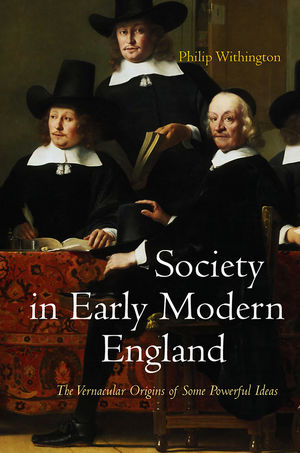
Society in Early Modern England
Seiten
2010
Polity Press (Verlag)
978-0-7456-4130-0 (ISBN)
Polity Press (Verlag)
978-0-7456-4130-0 (ISBN)
The sixteenth and seventeenth centuries have traditionally been regarded by historians as a period of intense and formative historical change, so much so that they have often been described as early modern' - an epoch separate from the medieval' and the modern'.
The sixteenth and seventeenth centuries have traditionally been regarded by historians as a period of intense and formative historical change, so much so that they have often been described as ‘early modern' - an epoch separate from ‘the medieval' and ‘the modern'. Paying particular attention to England, this book reflects on the implications of this categorization for contemporary debates about the nature of modernity and society. The book traces the forgotten history of the phrase 'early modern' to its coinage as a category of historical analysis by the Victorians and considers when and why words like 'modern' and 'society' were first introduced into English in the sixteenth and seventeenth centuries. In so doing it unpicks the connections between linguistic and social change and how the consequences of those processes still resonate today.
A major contribution to our understanding of European history before 1700 and its resonance for social thought today, the book will interest anybody concerned with the historical antecedents of contemporary culture and the interconnections between the past and the present.
The sixteenth and seventeenth centuries have traditionally been regarded by historians as a period of intense and formative historical change, so much so that they have often been described as ‘early modern' - an epoch separate from ‘the medieval' and ‘the modern'. Paying particular attention to England, this book reflects on the implications of this categorization for contemporary debates about the nature of modernity and society. The book traces the forgotten history of the phrase 'early modern' to its coinage as a category of historical analysis by the Victorians and considers when and why words like 'modern' and 'society' were first introduced into English in the sixteenth and seventeenth centuries. In so doing it unpicks the connections between linguistic and social change and how the consequences of those processes still resonate today.
A major contribution to our understanding of European history before 1700 and its resonance for social thought today, the book will interest anybody concerned with the historical antecedents of contemporary culture and the interconnections between the past and the present.
Phil Withington is Lecturer in Early Modern History at the University of Cambridge
List of Figures and Illustrations. Acknowledgements.
Introduction: Early Modernity and its Malcontents.
Section One: The History of an Historical Category.
Chapter Two: The Victorian Struggle for Modern History.
Chapter Three: The Concept of Early Modernity.
Section Two: Keywords.
Chapter Four: What did 'Society' Mean in Early Modern England?
Chapter Five: The Rise and Fall of 'Commonwealth'.
Chapter Six: 'Modern' and the English Vernacular.
Section Three: Practice.
Chapter Seven: The Sociable Self.
Chapter Eight: Colony and State.
Conclusion: We Really Are Modern.
Bibliography.
| Erscheint lt. Verlag | 13.8.2010 |
|---|---|
| Verlagsort | Oxford |
| Sprache | englisch |
| Maße | 155 x 229 mm |
| Gewicht | 476 g |
| Themenwelt | Geschichte ► Allgemeine Geschichte ► Neuzeit (bis 1918) |
| Geisteswissenschaften ► Geschichte ► Regional- / Ländergeschichte | |
| Geschichte ► Teilgebiete der Geschichte ► Kulturgeschichte | |
| Geschichte ► Teilgebiete der Geschichte ► Sozialgeschichte | |
| ISBN-10 | 0-7456-4130-X / 074564130X |
| ISBN-13 | 978-0-7456-4130-0 / 9780745641300 |
| Zustand | Neuware |
| Haben Sie eine Frage zum Produkt? |
Mehr entdecken
aus dem Bereich
aus dem Bereich
Europa 1848/49 und der Kampf für eine neue Welt
Buch | Hardcover (2023)
DVA (Verlag)
48,00 €
Giordano Bruno - ein ketzerisches Leben
Buch | Hardcover (2024)
C.H.Beck (Verlag)
29,90 €


